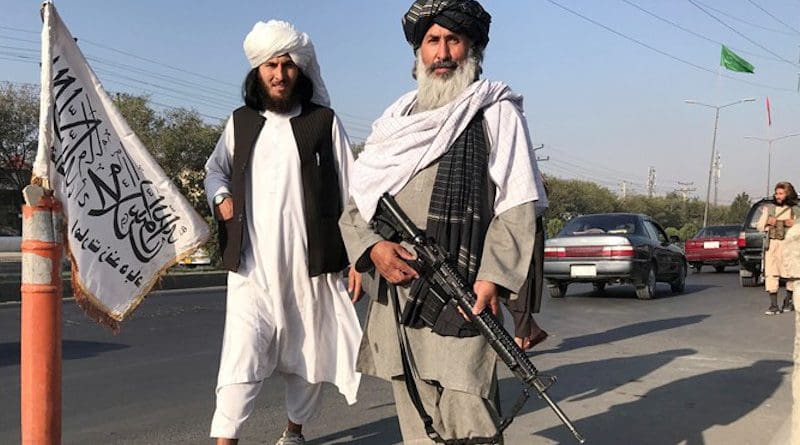Power Tussle Between ISKP And IEA Over Recent Fatwa By Afghan Taliban – OpEd
The Islamic State Khorasan Province (ISKP) recently released a 59-page booklet in Pashto that has reverberated across the region and the global security landscape. This document’s contents are far from inconsequential; it not only nullified the Fatwa issued by the Islamic Emirate of Afghanistan (IEA) but also extended an unexpected invitation to low-ranking Taliban members to join its ranks. This development signifies a complex and deeply troubling situation, shedding light on a dispute over religious authority, the fluidity of alliances, and the ongoing power struggle within Afghanistan’s turbulent landscape.
The ISKP’s rejection of the IEA’s Fatwa carries significant implications that reach far beyond a simple theological disagreement. The Fatwa, deeply rooted in Sharia law, was a cornerstone of the Taliban’s endeavor to consolidate their rule over Afghanistan following their return to power. By publicly nullifying it, the ISKP not only undermines the IEA’s religious legitimacy but also questions the very ideological foundation upon which the Taliban’s governance is constructed. This challenge to religious authority within Afghanistan’s Islamist landscape reflects a broader pattern of radical groups attempting to shape their own interpretations of Islamic law to suit their political ambitions.
What adds layers of complexity to this already intricate situation is the broader context of extremist factions operating in the region. There’s an ongoing nexus between the ISKP and the Tehrik-i-Taliban Pakistan (TTP), aimed at countering the influence and control of the Afghan Taliban (TTA). The TTP, in response to the Taliban’s Fatwa, has hinted at a potential alignment with the ISKP’s stance in rejecting it. This alignment underscores the intricate web of allegiances and rivalries that define the militant landscape in the region. The ISKP’s strategic decision to extend an invitation to lower-ranking Taliban members to join its ranks represents a concerning tactical move. This action is consistent with the playbook of extremist factions, which often seek to weaken their adversaries from within. By targeting the lower echelons of the Taliban, the ISKP aims to sow seeds of internal dissent and discord, potentially leading to fragmentation and instability within the ranks of its rival group. This could have severe consequences for Afghanistan’s security landscape, creating additional challenges for the IEA in maintaining stability and control.
The invitation extended to Taliban defectors is a stark reminder of the ever-present threat posed by extremist groups exploiting vulnerabilities within Afghanistan. The country’s decades-long conflict has left deep scars, and radical organizations are adept at capitalizing on disillusionment, grievances, and divisions within Afghan society. Such tactics can further exacerbate an already fragile state of affairs, perpetuating violence and instability. It is worth noting that allegations of the ISKP operating as an Indian proxy with an anti-Muslim or anti-Islamic agenda should be subjected to rigorous scrutiny and substantiated by credible evidence. Afghanistan’s complex security landscape involves various actors with diverse motivations, making it crucial to base assessments on well-founded intelligence and analysis.
The ongoing ideological struggle between the ISKP and the IEA also raises questions about the nature of extremism and its relationship with religion. Extremist groups often manipulate religious doctrine to further their political objectives, leading to a distorted interpretation of Islam. This distortion not only poses a threat to regional and global security but also tarnishes the image of Islam as a whole.
In conclusion, the ISKP’s recent actions, including the rejection of the IEA’s Fatwa and the invitation to Taliban defectors, highlight the ongoing turmoil within Afghanistan. This turmoil extends beyond mere political power struggles; it delves into the realm of religious authority and ideological divisions. The alignment between the ISKP and the TTP against the Taliban further complicates the security situation, necessitating the IEA’s concerted efforts to assert control and stability.
As Afghanistan grapples with these challenges, the international community must remain vigilant and engaged, striving for a peaceful and stable Afghanistan that can resist the influence of extremist factions. The path toward stability and lasting peace in Afghanistan is undeniably fraught with complexity, but it is a goal worth pursuing for the sake of regional and global security. The world must continue to monitor and respond to these developments with a clear understanding of the multifaceted nature of extremism and the underlying factors driving it. Only through a coordinated and comprehensive approach can we hope to address the root causes and consequences of such extremism, ultimately leading to a more secure and peaceful future for Afghanistan and the region at large.

